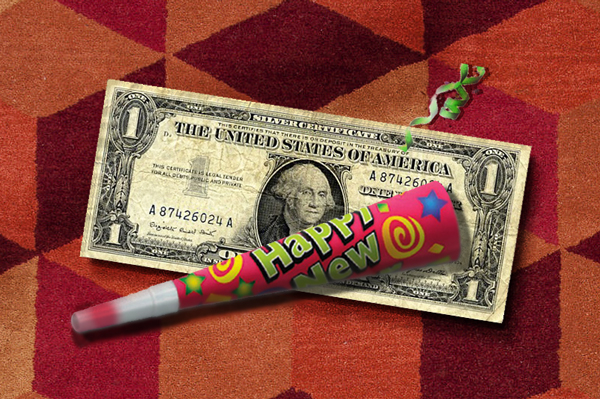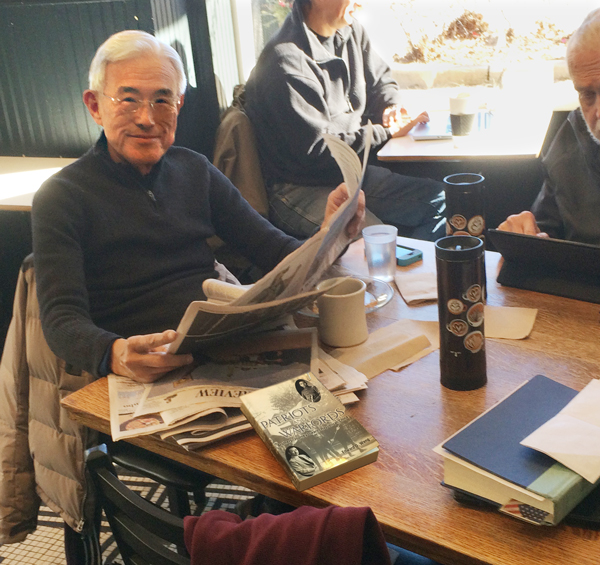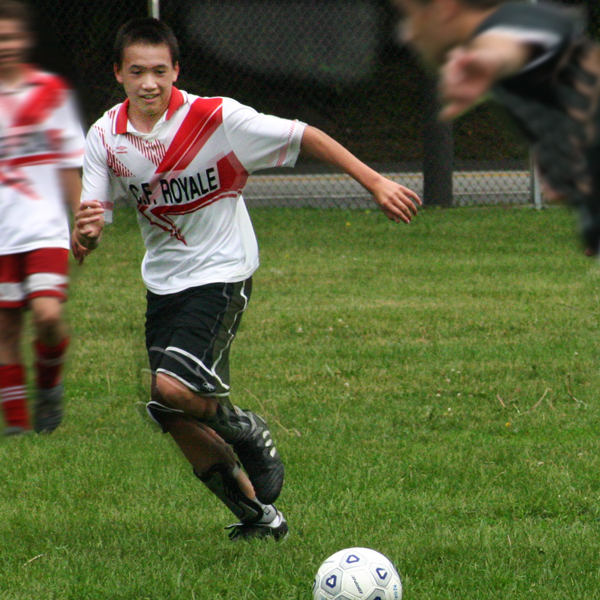New Year’s Bet
 A remarkable number of people bet on promises they know are too good to be true.Carl Mendenhall came to their houses on some New Year’s Eves — other years they went to his.
A remarkable number of people bet on promises they know are too good to be true.Carl Mendenhall came to their houses on some New Year’s Eves — other years they went to his.
Blizzards, sub-zeros temperatures, icy roads, nothing stopped the three families from being together.
Carl had a face made for making kids laugh and the more beer he drank the more useful that face became. “I’m a card.” he liked to say about himself. (‘A card’ used to mean someone who jokes around.)
The Weichels and the Mendenhalls and the kids’ parents played poker and shared limburger cheese, pickled pigs’ feet, whiskey and such. The stationary tube in the basement was filled to the top with chipped ice and soft drinks. The kids could eat and drink as much as they wanted that one night of the year. Every light in the house was lit, including the fake fireplace and the enameled sconces over the mantel. It was a show of good cheer.
One New Year’s Eve, Carl offered a wager to the younger kids, He bet them they couldn’t stay awake until midnight.
“Go get one of your dollars and put it there in the middle of the floor where we can keep an eye on it.” he said to them.
“If you can stay awake until the new year, you win. You can pick that dollar right up and put it in your pocket. It’s yours to spend anyway you want.”
The kids’ parents and older siblings tried to explain Carl’s scam. But what with the sugar and the freedom they enjoyed that night, the little ones wanted nothing more than to believe.
This New Year’s Eve is a particularly good time to remember Carl Mendenhall and his trick.
During the past year a remarkable number of people — not a majority but enough to make a difference — placed a bet on promises they know are too good to be true.
And now we all have a dollar sitting on the floor, at risk.
But this time the bet is going to be harder to win. Instead of staying awake until midnight we’ll have stay awake for the next four years.![]()
The Wang Creed
 He knew that he and the world he lived in would not long survive.At the height of the Second World War when civil strife was continuing to tear through China, Bogun Wang’s [Wang Bogun] health was failing.
He knew that he and the world he lived in would not long survive.At the height of the Second World War when civil strife was continuing to tear through China, Bogun Wang’s [Wang Bogun] health was failing.
The educator and revolutionary feared for his family.
As the head of a clan whose prominence traced back nine generations, Bogun rewrote the centuries-old Wang family creed to guide his heirs through catastrophic times. My good friend Ed is his son.
Above all else the Wang Creed called for filial piety. Respect for elders and ancestors was the primary virtue stressed by Confucius, the revered philosopher who has shaped Chinese life since 500 BC.
Bogun warned that his society was turning from agriculture to commerce and that education would be the key to stability. He preached that those who inherit wealth cannot afford to be idle. The privileges and resources of the clan were dwindling, they would need to be shared and used wisely.
When the Communists gained power, Bogun’s widow Zhining and her children took asylum in the U.S., leaving Bogun’s world behind.
Ed has not updated the formal code of conduct as his father did.
What he has done, at the urging of his children, is to write a book that recounts his family’s role in revolutionary China. Like Bogun’s efforts, Ed’s book is a personal gift from a father to his family. A show of filial piety in reverse.
‘Patriot and Warriors’* will be archived and crawled far beyond the world of people named Wang — historians are a hungry bunch.![]()
*Patriot and Warriors is now available at Amazon
Text Of The Wang Family Creed
When I was a child, my father had taught me that we should unite our family with filial piety and friendship… Read more…
Father, Son and Sports
 No one had ever played varsity. Coaching scouts didn’t know the family existed.The six-year-old playing in his first soccer game had no idea of the hopes his father had placed on him.
No one had ever played varsity. Coaching scouts didn’t know the family existed.The six-year-old playing in his first soccer game had no idea of the hopes his father had placed on him.
He didn’t know his family never had a trophy displayed on the mantle and never saved a press clipping from the sports section. No one played varsity. Coaching scouts didn’t know the family existed.
The boy’s father’s was determined to do something about that.
He’s a man with bad eyes and worse reflexes but he appreciates what sports can contribute to a child’s life. He admires athletes for their prowess and understands why people wear franchised logos, He sometimes featured sports legends in the ads he created for his clients. He tries not to be envious.
The man saw to it that his son was exposed to hockey, baseball, football and basketball. Golf and tennis were offered at school.
The boy joined a soccer league during kindergarten and took to the sport.
In the first minutes of his first game, the ball found its way exactly two paces in front of his power foot. “It might be a long time before you score again,” his coach laughed. And it was.
When the boy’s father volunteered as a referee, the league issued a uniform with a jersey, shorts and socks but he couldn’t bring himself to wear it— it’s risky for a guy who barely understands the game to look so professional.
The boy played on a team until late into high school when AP courses demanded his attention. He still gets together with friends and former teammates to watch sports.
He can rattle off stats and trivia with the best of them. When he and his old man are together, looking for things to talk about, he patiently explains the finer points of major league sports. That’s his job.
Being the jock in the family carries certain responsibilities.![]()
Tradelasts
 …now he knew the whole thing wasn’t a figment of his imaginationNot long after the dinner party in the suburbs, the guest lost touch with the family that had invited him.
…now he knew the whole thing wasn’t a figment of his imaginationNot long after the dinner party in the suburbs, the guest lost touch with the family that had invited him.
He had been warned they were a competitive bunch, that there were grudges and resentments among the four siblings and their spouses. A few of them could be expected to cross the line. No family is perfect.
It wasn’t the conversation or the food or even the generous selection of malt whiskeys that surprised him, it was what happened after the table was cleared.
The father of the clan, somewhere in his sixties, tapped his glass to get everyone’s attention. When they were quiet, he repeated something an acquaintance had said about his wife earlier that day. All eyes went to her. Even in the candlelight, the guest could see that she was blushing.
As the family sipped coffee and picked through chocolates, they took turns tapping their glasses and passing second-hand compliments around the table. These ‘tradelasts’ — that’s what the family called them — had an effect on everyone.
During the forty years since that evening, the guest has never heard the custom mentioned again, not even on Masterpiece Theatre.
He decided to search ‘tradelast’ online. There were only three vague mentions but now he knew that the whole thing wasn’t a figment of his imagination.
All of this has happened at just the right time. Things have turned ugly lately and, like a lot of Americans, he’s looking for something to hold on to.![]()

